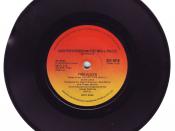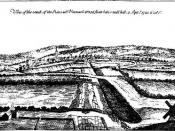The relationship between man and machine is often closer than we care to admit. Man and machine often share characteristics. There are machines that emulate human form, function, or behavior, and people who exhibit mechanical characteristics. This latter similarity is discussed in Mary Moss's article, "Machine-Made Human Beings," and Herman Melville's "The Paradise of Bachelors and the Tartarus of Maids." Both writings discuss the often-disturbing ways in which human beings act like machines, including uniformity in appearance and behavior. However, their words fail to create imagery as powerful as that of the film "Pink Floyd - The Wall," which presents disturbing, yet strangely comic, visuals of children being broken down and remade as uniform beings by the educational system.
The prominent theme in Moss's article is uniformity - uniformity of appearance, of habits, of personal preferences, and of behavior. She regards uniformity as detrimental to one's character, as it inhibits, if not prevents, individuality.
She begins by lamenting the fact that "Beyond a handful of born leaders⦠and a yet smaller group who find no prohibitive effort in the repulsive act of thinking⦠mankind has instinctively gravitated toward uniformity." She then proceeds to criticize the ways in which society pushes uniformity on people, including the wearing of similar clothing to keep up with current fashion, listening to music simply because it is new and forgetting the classics, and scorning older books in favor of the newer books that everyone else seems to read. She uses the phrase "machine-made" repeatedly, which serves to create the image of people being stamped out by a machine or cast from the same mold. Such uniformity only serves to stifle individuality and make human beings not only machinelike in their physical similarity, but also robotic in their inability to do anything but rigidly and mechanically follow the trends society sets for them, never able to even conceive of an original idea.
Herman Melville also denounces conformity through the experiences of his main character, who explores a paper factory in the "Tartarus of Maids" section of his essay. He examines the imposing machinery and notes how the workers exhibit the characteristics of the machines they tend. He then points out the way in which man and machine have been juxtaposed in this factory, stating that "Machinery - that vaunted slave of humanity - here stood menially served by human beings⦠The girls did not so much seem accessory wheels to the machinery as mere cogs to the wheels." The girls he speaks of move as machines would: rhythmically but emotionlessly. He moves deeper into the factory and finally stands before a giant paper-pressing machine. It dwarfs its workers and fills the narrator with awe. He witnesses the paper exiting the machine and is struck with a revelation: "I seemed to see, glued to the pallid incipience of the pulp, the yet more pallid faces of all the pallid girls." The workers do not simply tend the machine - they have become a part of it.
The movie "Pink Floyd - The Wall" rails against uniformity with its imagery. There is very little dialogue in the film. Instead, the haunting music of Pink Floyd serves as the soundtrack, creating sometimes humorous, but more often unsettling, images.
In one scene, the main character envisions his school as a giant machine into which people are fed, supposedly to become educated, but in reality to become nothing more than an indistinct mass, every person exactly like the next. The children walk into the machine in single file, all marching to the beat of "Another Brick in the Wall." We see that they are wearing stylized school uniforms, each identical to every other right down to the shoes. The girls all wear their hair in the same style, as do the boys. The children continue to march, disappearing behind a gray brick wall festooned with moving gears and the shadows of pumping pistons, and are next seen sitting at desks with their hands folded rigidly in front of them, moving on a mechanical conveyor belt. Each sits in exactly the same position. As they appear on the conveyor belt, we see that they are all wearing masks, flesh-colored and bland, with three plain, round, black holes for the eyes and mouth. There is absolutely no difference between any two of these masks. The children have now become what some viewers of the film call "meat-puppets." This chilling image brings Mary Moss's words to life, giving us a picture of "Machine-Made Human Beings." However, the scene continues.
The meat-puppets, now out from behind their desks, march in long lines through the hallways of the school-machine. As their "education" continues, they become more and more alike. They march in lock step, never breaking formation. The walkway finally comes to an end - an abrupt drop into nothingness over which the puppets blindly march. The camera follows them down into a huge metal funnel, which is eventually revealed to be a giant meat grinder out of which are extruded ropes of flesh-colored paste - all that remains of the children.
The process of creating uniformity is now complete; not only has the educational machine robbed the children of their outward individuality and stolen their free will and ability to think for themselves, but it has also reduced them to a shapeless mass in which people are not even distinguishable. This disturbing scene echoes Melville's words, painting the picture starkly and clearly. Just as the girls in the paper factory, the children have been chewed up and spit out by the machine. In Melville's essay, the workers are cogs in the machine; in "Pink Floyd - The Wall," they are "just another brick in the Wall." The film and the two essays all denounce conformity. Each shows, in its own particular way, how conformity is detrimental and harmful to the human spirit. Whether conformity is induced by the fads society follows, or forced on one by a faceless educational system, or beaten into one by an unforgiving machine, the effect remains the same. However, one does not have to bow to conventionality. If a person simply decides to think for themselves, make their own decisions, and not allow what everyone else says, does, or thinks to dictate what they themselves say, do, and think, they need never don the mask of a meat-puppet.




